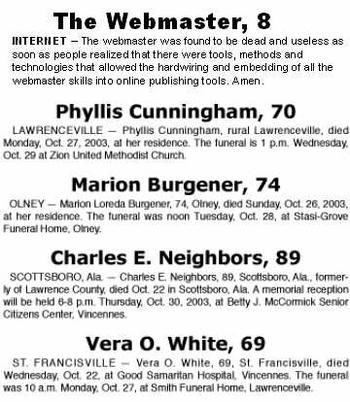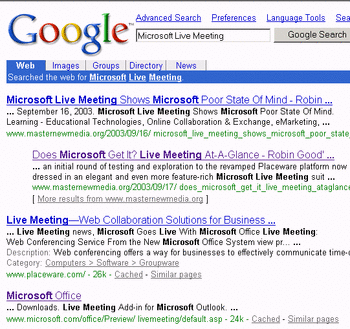Obituary Of The Webmaster
The role of Webmaster has evolved since the earliest intranet sites. In the beginning, the Webmaster was responsible for a specific Web server, and the workstation or PC on which it ran. The Webmaster installed the software and set up the Web site, often on his or her own computer. If someone else wanted to publish content on the site, he would contact the Webmaster and reach an agreement to have the Webmaster put it on the Web server.Webmasters historically were "techies" who bridged the gap between Web technology and those who lacked technical know-how but had content to share. The ubiquitous Webmaster e-mail link--providing a way to contact the person responsible for the server--harks back to those days.
Source: Clarifying the Role of the Corporate Webmaster , 1998, (c) Meckler Media
I really don't enjoy much of what I discover and learn if I am not duly challenged on the new ideas I bravely try to bring forward.
Some say I am too simplistic, some don't like my radical view of things, but then again this is the role I have chosen. One of challenger of the status quo, one of questioner of the prevailing thoughts and habits and one promoting a more intelligent and evolved use of our communication abilities and new media technologies to effectively transform for the better the world we live in.
So it comes as a really welcome challenge the short post of a professional corporate Webmaster who rightly takes to defence his role and usefulness within the enterprise.
Thanks François for giving me this opportunity to clarify some of my simplistic views and to provide an even clearer explanation of why the webmaster, as a product of the enterprise is really dead.
François Nonnenmacher writes in his excellent padawan.info weblog:
The Death of the Webmaster - some good points and many wrong ones.For one, the webmaster is far from being dead (am I?), only those who rely on being the technical bottleneck to keep their job will disappear.
But contrary to what the author claims, things such as usability, information architecture and how to purpose content towards the web and search engines require skills (e.g. those of a webmaster) and are not taken care of by technologies.
We obviously have not the same definition of a webmaster (who, to me, is not reduced to the HTML techie this guy is depicting.)
Wonderful.
Let's take François comments one by one and let's clarify more precisely what I originally intended in my article.
"For one, the webmaster is far from being dead (am I?), only those who rely on being the technical bottleneck to keep their job will disappear."
François said it all in the very sentence! He is with me!
He understands and states that those webmasters that "rely on being the technical bottleneck" are going to disappear. But the very fact that I need to go to a technical person to publish a piece of content or to add a picture to a page makes the issue far more technical than it needs to be, and the webmaster role a 100% technical one.
If anyone could drag, drop, resize and edit in place any content on any page with a click of their mouse, who would want to have a webmaster and why? (I know you say there are all those other points why the webmaster is deadly indispensable but I am coming to them in the next questions).
"But contrary to what the author claims, things such as usability, information architecture and how to purpose content towards the web and search engines require skills (e.g. those of a webmaster) and are not taken care of by technologies."
Let's take the above points one by one:
- usability - if webmasters are the ones that provide usability to Web sites than I must have been in the wrong universe until now. None of the webmasters I have known, hired or worked with has ever had any type of usability awareness or skill.
In my understanding usability engineers, interface designers and UI specialists exist exactly for this purpose. If I am wrong please correct me.
- information architecture - the organization and structuring of content is not something a serious company would ask from a webmaster.
Though it is trivial to say that in principle and following François reasoning one could ask a webmaster also to create animations, to edit audio clips or to design new page layouts, this only confirms my initial statement and axiom:
de facto, the webmaster is someone to be used for doing those technical tasks that nobody in her right mind wants to learn or do herself (when it comes to online publishing).
So, should we fuel a profession that has been born due to the fallacies of the technology solutions we were provided with or should we seek to improve those technologies in the first place while trying to throw away the crutch we are using to run?
Can I do better information architecture by providing the content author with simple to use visual tools that allow her to sift, filter, organize and try out different options of how the content at hand should be organized or do I charge the webmaster with this task so that I can be sure that the "About", Site map" and Contact" buttons are in the right place?
In essence, what credentials would a professional webmaster have to carry out an information architecture job?
- visibility on search engines - if we still needed webmasters to have effective visibility on Google and other major search engines then I would have long given up scoring good results in this direction.
Try this and tell me who is got a better webmaster: me or Microsoft?
Go to Google and search for "Microsoft Live Meeting" and tell me what you find. (click here for a direct link to the search results). How is that? (photo record at the bottom of the article).Do you think I needed a webmaster to achieve this?
Forget it.
A good micro content management system that allows me to freely title my pages and some good updated know-how on how search engines work (today) gives me one hundred times more capability to do well on the search engines than any webmaster will.Overall the great majority of issues relating to
- effective content management,
- usability,
- ease of access,
- consistency,
- compatibility with official standards,
- visibility on search engines
- editorial approval workflows
can today be fully managed by many of the great content management systems and weblogs available today.Unfortunately the belief that the Web is a techie thing still lingers on and often people are led into believing that webmasters are still a critical element in the publishing chain.
Hardwiring the requirements into the tools to make sure they're applied is absolutely sound and common-sense.
From a 1998 article:
"The role of Webmaster gained complexity, and four functional areas emerged: systems administration, e-mail clearinghouse, publisher training, and content management.
Perceptive companies have filled each role with different people, often giving the e-mail clearinghouse and publisher training functions to a single person.
For most companies, the content management function has moved out into the business areas so that every business area manages its own content--they don't shift the burden to IT "specialists" any longer.
Confusion as to what skills define the Webmaster role arises because the term Webmaster is still used in reference to all four of these roles."
Source: Clarifying the Role of the Corporate Webmaster, 1998, (c) Meckler Media
Disclaimer: Webmasters are not really dead. There are still plenty of situations where having one can greatly help. My articles want only to point out to a direction that we have already taken and which happily brings back to each one more space to actually create and manage useful businesses, tasks and activities without the need of carrying an auto-part mechanic along throughout the journey.
Original article:
The Death Of The Webmaster: Why Weblogs Bring A True Revolution To Internet PublishingFrançois Nonnenmacher original short commentary.
- effective content management,



blog comments powered by Disqus